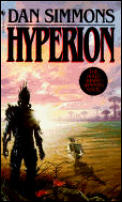
| Series: | Hyperion #1 |
| Publisher: | Bantam |
| Copyright: | June 1989 |
| Printing: | December 1995 |
| ISBN: | 0-553-28368-5 |
| Format: | Mass market |
| Pages: | 482 |
This is my 100th book review (rather ahead of schedule), so I wanted to do something special. I've been thinking about re-reading the whole Hyperion series for years now. This seemed like a good excuse.
The structure of Hyperion is an homage to the Caterbury Tales. A very mixed group of travellers from all over Simmons's far-future universe meet in a pilgrimage to the world of Hyperion, home to the mysterious Time Tombs and the killing machine called the Shrike. In the hope of figuring out why they, out of all of the possible pilgrims, were chosen and what might be going on, they agree to tell each other their stories and their reasons for going to Hyperion.
The stories are a beautiful mix of different aspects of science fiction. There's a first contact story, some military SF, social satire, literary symbolism, colonial rebellion, cyberpunk, hard-boiled detective, a touch of horror, and two beautiful stories of personal tragedy. Each story has its own voice, its own style, and its own narrative technique. They're all wonderfully told (with the minor exception that the very beginning of the first story can be a bit slow), separate and unique, and yet all blend together into a larger narrative. This isn't a collection of unrelated tales; after the first few stories, the reader can see deeper patterns, can sense forces coming together, can see effects of one story in another, and feels the storm gathering.
Hyperion does not have a true ending. It is part of a book split in half for publishing reasons, and the sequel The Fall of Hyperion completes the story. That being said, it also has one of the most beautiful and perfectly delivered endings of any book I've read. Every time I read it, it leaves me shaking my head in wonder at the tone it captures.
This is a remarkably well-written book. It attempts a risky narrative structure that could leave it feeling fragmented and scattered, and instead pulls off the convergance of threads with panache. It features eight major characters with separate stories and backgrounds, gives them each completely different motives, voices, and moral structures, and still makes me care about every one of them and respect them in their own separate ways. It also features one of the most heart-rending gut-punches of a story that I have ever read; the scholar's tale makes me cry every time I read it.
I'm very glad it had been ten years since I'd read Hyperion, since it had been enough time for me to forget some of the twists of the plot and enough distance for some of the scenes to regain their emotional impact. That emotional power is what I love best about it, so I expect I'll have to wait even longer next time before reading it again.
Not only do I give this book my highest recommendation, I've been known to buy copies of it for friends. If you love science fiction, I don't think you'll regret reading it. (And be sure to also get The Fall of Hyperion so as not to miss out on the rest of the story.)
Followed by The Fall of Hyperion.
Reviewed: 2004-12-16